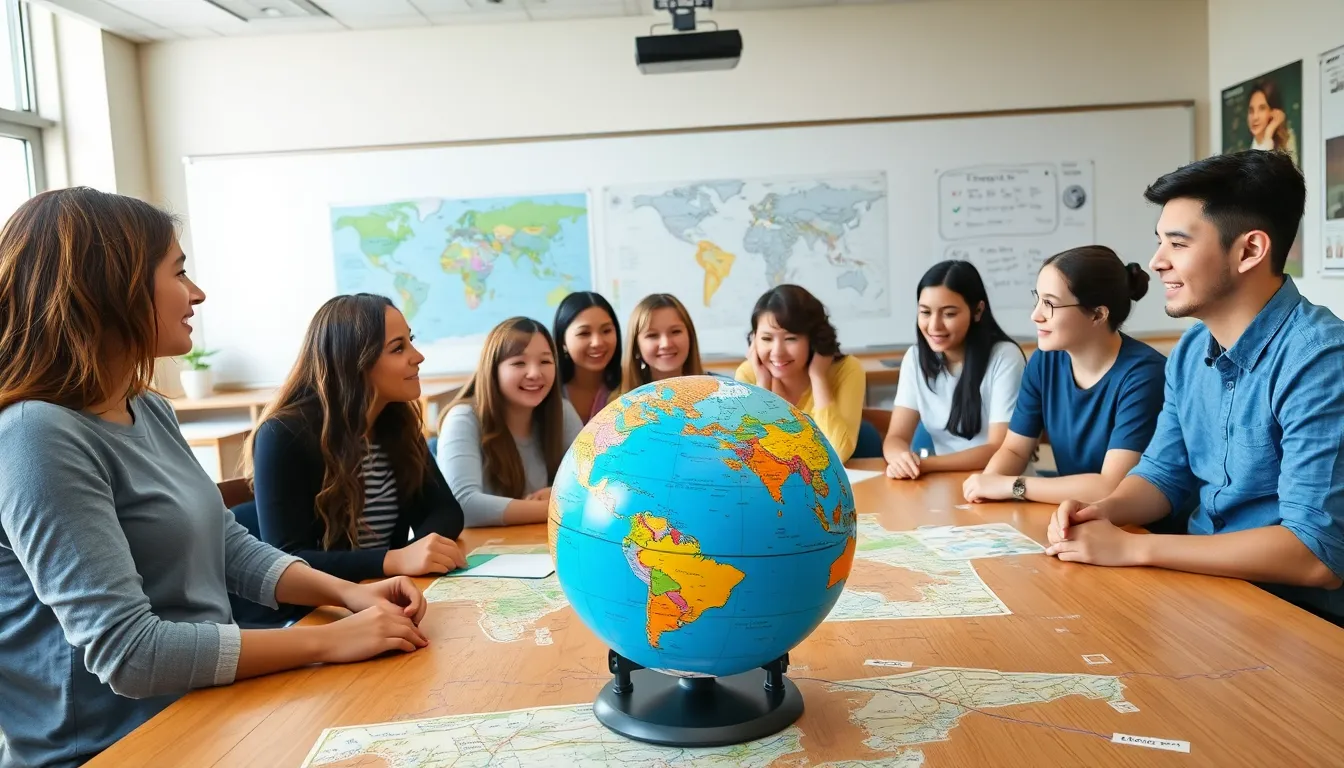Table of Contents
ToggleIn a world where borders blur and global issues reign supreme, a Master’s in Global Affairs might just be the passport to your future. Imagine diving into the complexities of international relations while honing your skills to tackle pressing challenges like climate change, human rights, and global security. It’s like a superhero training program, but instead of capes, you’ll earn a degree that opens doors to a career filled with impact.
Overview of Masters In Global Affairs
Masters in Global Affairs prepare students for critical roles in a rapidly changing world. This interdisciplinary program offers in-depth knowledge in international relations, economics, and development. Courses often cover essential topics such as global governance, conflict resolution, and sustainable development.
Students benefit from a curriculum that emphasizes real-world applications. They engage in case studies, simulations, and group projects. Through hands-on experience, participants develop problem-solving skills vital for addressing global issues.
Many institutions offer specialized concentrations within this degree. Examples include international security, public policy, and humanitarian assistance. Each concentration allows students to tailor their education to specific interests and career goals.
Networking opportunities also arise through this program. Students frequently connect with professionals in government, NGOs, and multinational corporations. Such connections enhance job prospects and provide valuable insights into the field of global affairs.
Graduates often pursue diverse career paths. Common employers include international organizations, think tanks, and private firms. The skills acquired during the program are highly sought after, making it easier for graduates to find impactful roles.
Ultimately, pursuing a Master’s in Global Affairs equips individuals with the tools necessary to tackle some of the most pressing global challenges today. This degree fosters a deeper understanding of the interconnectedness of global issues and prepares students to contribute meaningfully to solutions.
Core Curriculum

The core curriculum of a Master’s in Global Affairs focuses on equipping students with essential knowledge and practical skills. This framework addresses complex global issues through an interdisciplinary approach.
Required Courses
Required courses form the backbone of the program. These classes often include International Relations, which provides insights into global politics. Students also engage with Economics, examining market dynamics and fiscal policies impacting nations. A course on Global Governance emphasizes the structures and institutions that shape international relations. Conflict Resolution equips students with strategies for mitigating disputes between countries. Sustainable Development is critical for understanding economic growth while preserving environmental balance.
Elective Courses
Elective courses offer students the chance to tailor their education. Various options allow exploration of specialized areas like International Security, focusing on threats and protective measures in a global context. Public Policy examines the crafting and implementation of government strategies. Courses in Human Rights delve into advocacy and legal frameworks supporting global justice. Areas such as Development Economics address poverty alleviation and economic empowerment in underserved regions. Each elective aims to deepen understanding and enhance expertise in specific interests.
Skills Developed
A Master’s in Global Affairs cultivates essential skills that prepare graduates for impactful roles across various sectors. These skills include critical thinking and cross-cultural communication, which prove crucial in addressing today’s global challenges.
Critical Thinking
Critical thinking skills emerge as a cornerstone of the Master’s program. Students learn to analyze complex issues and assess diverse perspectives effectively. Problem-solving becomes second nature as they evaluate real-world scenarios and devise strategic solutions. Through case studies and simulations, individuals sharpen their ability to question assumptions and synthesize information. This analytical approach enhances decision-making capabilities essential for roles in international organizations, government agencies, and NGOs. Graduates regularly navigate multifaceted global challenges with confidence, leveraging their refined critical thinking to drive meaningful change.
Cross-Cultural Communication
Cross-cultural communication skills play a vital role in the curriculum. Students engage with diverse perspectives, enhancing their ability to communicate across cultures. This exposure facilitates understanding of various cultural norms and values that influence global interactions. Courses incorporate practical experiences that develop proficiency in conveying ideas effectively in multicultural settings. Negotiating and collaborating with people from differing backgrounds becomes more intuitive. With these skills, graduates often excel in international diplomacy, humanitarian efforts, and global business environments. Building relationships across borders empowers them to foster cooperation and drive progress on pressing global issues.
Career Opportunities
A Master’s in Global Affairs opens doors to diverse career paths. Graduates can explore options in various sectors, each offering unique opportunities to make a significant impact.
Government and Nonprofit Sector
Engaging with the government or nonprofit sector allows professionals to address crucial global issues directly. Positions often include roles in policy analysis, international development, and diplomacy. Organizations like the United Nations, World Bank, and various NGOs actively seek individuals equipped with the analytical skills essential for crafting effective solutions. These roles emphasize collaboration and advocacy, with professionals working to promote human rights, environmental sustainability, and conflict resolution. Networking with key stakeholders enhances prospects, enabling graduates to influence policies and implement programs that drive positive change on both local and global scales.
Private Sector Roles
The private sector also offers an array of opportunities for those with a Master’s in Global Affairs. Multinational corporations frequently recruit graduates for positions in corporate social responsibility, international relations, and global marketing. These roles require professionals to navigate complex markets and cultural landscapes, using their knowledge to build relationships and strategies that enhance business operations. Consulting firms value graduates for their ability to analyze global trends and provide insights on risks and opportunities. Furthermore, with the increasing focus on sustainability and ethical practices, companies seek experts who can align business objectives with societal needs, ensuring long-term success and growth.
Global Perspectives and Trends
Global affairs programs emphasize the importance of understanding diverse perspectives. Economic trends affect political stability, making awareness of both vital for aspiring professionals. International partnerships shape trade agreements, impacting economies around the world.
Climate change emerges as a pressing global issue, driving policy reforms and collaborative efforts. Sustainable practices become essential for governments and organizations committed to addressing environmental challenges. Social movements also influence policies related to human rights, prompting shifts in public opinion and legislation.
Various geopolitical dynamics play a crucial role in shaping international relations. Regional conflicts can disrupt the balance of power, leading to changes in diplomatic strategies. As a result, professionals equipped with analytical skills gain valuable insight into potential outcomes of such conflicts.
Technological advancements continually reshape global communication. Innovations in digital platforms facilitate collaboration among nations, allowing for increased dialogue and exchange of ideas. Awareness of these trends prepares graduates for effective engagement in international diplomacy.
Education in global affairs emphasizes the need to adapt to an evolving landscape. The interplay of culture, economics, and policy requires ongoing learning and flexibility. Those pursuing this path contribute significantly to developing solutions and fostering dialogue across boundaries.
Networking opportunities enhance career prospects, connecting students with industry leaders. Collaborations with professionals in government, NGOs, and the private sector broaden exposure to current global challenges. Graduates often leverage these connections to drive impactful initiatives locally and globally.
Pursuing a Master’s in Global Affairs is a strategic move for those looking to make a difference in an increasingly complex world. This degree not only equips graduates with essential knowledge but also hones critical skills necessary for addressing pressing global challenges. With a focus on interdisciplinary learning and real-world applications, students are well-prepared for impactful careers across various sectors.
The program’s emphasis on networking and cross-cultural communication ensures that graduates can navigate diverse environments effectively. As global issues continue to evolve, the ability to adapt and engage with different perspectives becomes paramount. A Master’s in Global Affairs truly empowers individuals to drive meaningful change and foster international cooperation.




